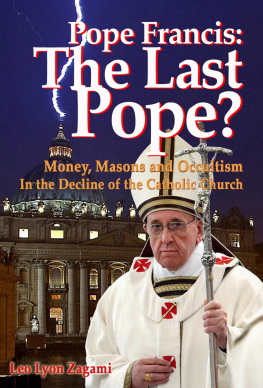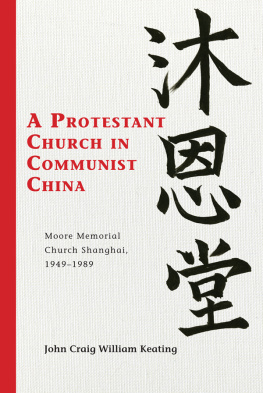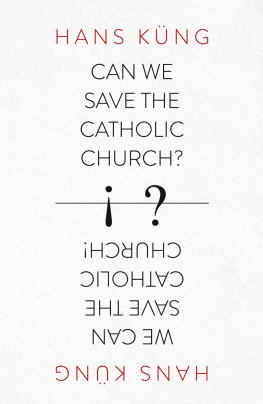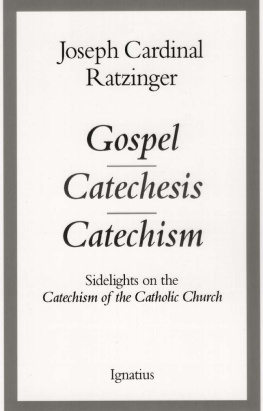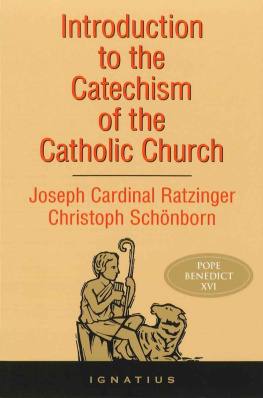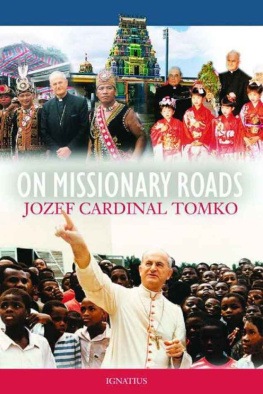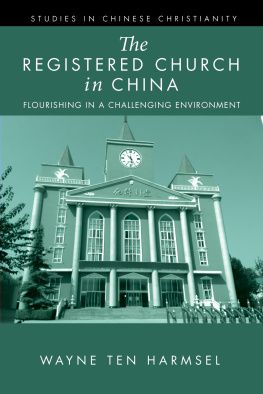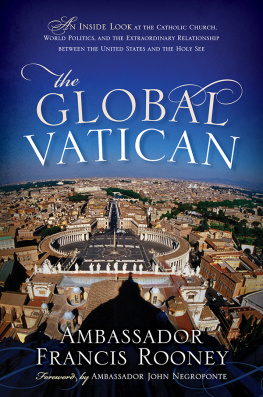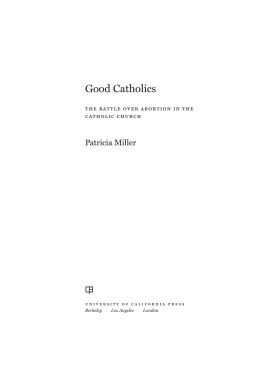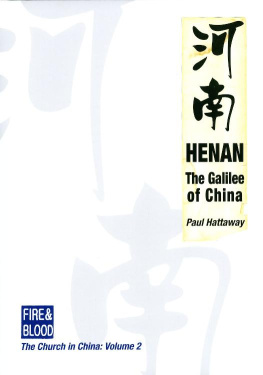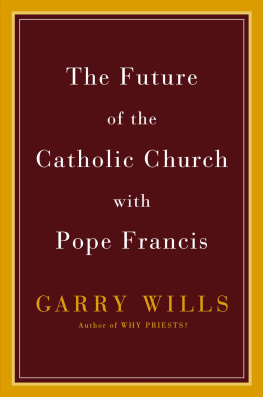FOR LOVE OF MY PEOPLE I
WILL NOT REMAIN SILENT
JOSEPH CARDINAL ZEN
For Love of My
People I Will Not
Remain Silent
A Series of Eight Lectures in
Defense and Clarification of the
2007 Letter of Pope Benedict XVI
to the Church in the Peoples
Republic of China
Translated by Pierre G. Rossi
IGNATIUS PRESS SAN FRANCISCO
Unless otherwise indicated, Scripture quotations are from Revised Standard Version of the BibleSecond Catholic Edition (Ignatius Edition) copyright 2006 National Council of the Churches of Christ in the United States of America. Used by permission. All rights reserved worldwide. The foregoing applies to Cardinal Zens commentary, but not to the Letter of the Holy Father Pope Benedict XVI to the Bishops, Priests, Consecrated Persons, and Lay Faithful of the Catholic Church in the Peoples Republic of China.
Unless otherwise noted, the English translations of all papal documents have been taken from the Vatican website.
Italian edition:
Per amore del mio popolo non tacer:
Ricordando il decimo anniversario della Lettera
di Papa Benedetto alla Chiesa in Cina
Choralife Publications, Hong Kong, 2018
English translation copyright 2018 Chorabooks,
Hong Kong, a division of Choralife Publisher Ltd.
All rights reserved.
Published in 2019 by Ignatius Press, San Francisco
ISBN 978-1-62164-314-2 (PB)
ISBN 978-1-64229-069-1 (EB)
Library of Congress Control Number 2018965658
Printed in the United States of America
CONTENTS
INTRODUCTION
by Aurelio Porfiri
This text contains a series of lectures that Joseph Cardinal Zen delivered in Hong Kong to commemorate the tenth anniversary of Pope Benedict XVIs 2007 Letter to the Church in the Peoples Republic of China. The lectures were in Chinese and then translated into Italian by the Cardinal himself, with the assistance of some native speakers. The tone is that of a lecturethat is, informal, which makes the reading more interesting and informative.
I met Joseph Cardinal Zen many years ago. For family reasons, I developed a strong relationship with the people of Hong Kong in 2000, almost twenty years ago. At the time, the Bishop of Hong Kong was John Cardinal Baptist Wu Cheng-chung, and his Coadjutor Bishop was Joseph Zen. Bishop Zen succeeded to Cardinal Wu in 2002 (and remained in this position until 2009). When reading newspapers and talking with people at that time, I learned of Cardinal Zens strong opposition to the Chinese government and their policies. I met him in Rome, when he was already Bishop of Hong Kong. I remember meeting him and experiencing his anger because of the behavior of the Chinese government against religion, especially the governments repressions and persecutions.
From 2008 to 2015 I had the occasion to live in Macau and work there. I have to say that I was influenced negatively about Cardinal Zen, who was portrayed to me as an obstacle between China and the Holy See. Thankfully, I learned later that I was wrong and repented in time, understanding that the real obstacle for the reconciliation between the Holy See and the Chinese government was the ideology behind the government: Communism, which wherever applied has always persecuted religions.
But let us go back a few months, around June 2018. During the recent years, I became a good friend with the Cardinal, so every time I visited Hong Kong I had dinner with him or met him for a chat. We also wrote a little book together in Italian, Lagnello e il dragone: Dialoghi su Cina e Cristianesimo (The lamb and the dragon: Dialogues on China and Christianity; Chorabooks, 2016), where the Cardinal also talked of his life and ideas. During one of our meetings, in June if I remember correctly, the Cardinal mentioned to me that he was revising a series of conferences given in Hong Kong about the Popes Letter to Chinese Catholics. The conferences, given in Chinese, presented the history and development of this document by Benedict XVI. So these conferences were written by a key witness, Cardinal Zen, who was involved in the preparation of the Letter. He was thinking of collecting all the conferences in a book. It happens that I have a small publishing company, which has already published books from outstanding writers, so of course I offered to publish the book in Italian. We were able to publish the book, one or two days before the date of the signing of the agreement (that was not revealed until the very moment of the signing, so we were really lucky to be able to achieve that). So the book was written prior to the provisional agreement; but it is very important to understand why that provisional agreement is not a good move. It is important to understand the background of the relationship between China and the Vatican in the last decades, and what the expectations are of the two sides; especially important is why the Letter of Benedict XVI was in the end not fully understood and implemented. The book has had many reviews in the Italian press and from important Catholic-oriented blogs, such as La Nuova Bussola Quotidiana, Duc in Altum , and Stilum Curiae . So we desired to have an English version because of the importance of the topics discussed. Read the book, make your assessment of the issues here described, and see if you do or do not share Cardinal Zens assessement, which is mine as well.
1
EVENTS BEFORE AND
AFTER THE ILLEGITIMATE
ORDINATION ATTEMPT
AND CANONIZATION
PROTEST IN 2000
First Lecture
June 19, 2017
This is the tenth anniversary of the Letter of Pope Benedict XVI to the Church in the Peoples Republic of China. The Letter was a precious gift that we must appreciate and remember. Let us also pray for the Pope Emeritus, that the Lord may grant him a long life.
This is the first of eight lectures that will present the precedents and issues connected to the Letter, so that it can be understood better and appreciated more.
Pope Benedict XVI
Pope Benedict XVI, the former Cardinal Ratzinger, is certainly qualified to write such a Letter, due to his experience of totalitarian regimes, first Nazism and then Communism. Thus, he could understand well the situation of a Church under a regime like that of the Peoples Republic of China. (Pope Benedict was born in 1927. When Nazism took over in 1933, he was six years old and lived under Nazi control until he was eighteen. Afterward, Germany was divided into West and East Germany, with the eastern part under the control of the Communists until 1990.)
Our high-ranking Vatican officials, most of whom are Italian, have not lived under such a totalitarian regime. This kind of a blessing, however, means that they have not had any direct experience under a totalitarian regime, and so their concept of it is somewhat naive and optimistic.
In addition to Pope Benedicts childhood experience regarding such regimes, he had the opportunity of learning about the Church in China when he was the Prefect of the Congregation for the Doctrine of the Faith (CDF). He took part in the meetings convened by the Congregation for the Evangelization of Peoples (CEP), with Prefect Cardinal Tomko, especially a final secret meeting on October 4, 2000.
Cardinal Tomko
Who is Cardinal Tomko? What has he done? How did those meetings go?
It is common knowledge that the Communist Party took power in China in 1949 and that it set up the Chinese Patriotic Catholic Association (CPCA) in 1957. The following year it began ordaining Bishops without a mandate from the Holy See. The years of the Cultural Revolution (19661976) were a time when every religion disappeared. After this, when leader Deng Xiaoping began a policy of openness, a new scenario unfolded. Before we had what was called the bamboo curtain, which hermetically sealed China from the rest of the world. Almost nothing was known about China. With the policy of openness, things changed. At the time, Cardinal Tomko, who is Czechoslovak and thus knows the Communists well, used to convene so-called secret meetings to face this new situation and to which he applied all his experience and wisdom.
Next page

